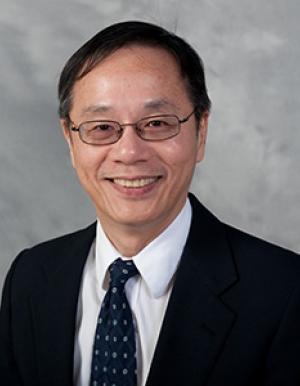 Vigor Yang, Ph.D.
Vigor Yang, Ph.D.Dr. Vigor Yang Member of U.S. National Academy of Engineering, Daniel Guggenheim School of Aerospace Engineering, Georgia Institute of Technology
Friday, March 24, 2023, 3:00 - 4:00 PM
In Person JH-109
Title: High-Fidelity Engineering Design Innovation for Complex Systems
Design is a strategic approach with an executable plan for achieving specific objectives. Design innovation empowers leaders to develop new solutions, add values, and envision new possibilities. At the highest level, design drives and inspires the advance of science and technology.
This lecture addresses data-enabled design of cmplex systems. Integration of data science with engineering science will allow architectures in which fully integrated modeling and simulations, data analytics, systems engineering, and design methodology can be exploited for the purposes of scientific discovery and the advancement of technology in complex systems. As a specific example, a new approach to the combustion dynamics in propulsion engines is discussed. The effort involves design of experiments, high-fidelity simulation and experiment, reduced-order modeling, uncertainty quantification, machine learning, and testing and certification. The developed paradigm enables efficient surveys of the design space and identification of the key design attributes that dictate the system behavior. The unified approach starts with high fidelity modeling and simulations of combustion dynamics in engines using large-eddy-simulation techniques. Reduced-basis models and emulation then leverage the established database for physics-based data assimilation. Stochastic-based extraction of physics from complex flowfields provides faithful and interpretable representations of the underlying mechanisms. Feature extraction techniques are incorporated into a spatio-temporal surrogate model built on machine-learning techniques such as Gaussian process (GP) regression. Combined with statistical methodologies and control theories, these techniques are integrated to allow for efficient design optimization and uncertainty quantification. Finally, a system-level model is developed for effective assessment of system behaviors.
This example is specific to a propulsion engine problem, but the general approach can be taken as a model. Other complex systems, such as aero vehicles, could be addressed following a similar paradigm. A big obstacle is the relative insularity of academic and research fields, as well as the divide between engineers/scientists with domain expertise and data science. Looking forward, a huge opportunity exists for the community in bringing together researchers in the engineering, data science, and computer modeling areas to collaboratively develop large-scale design systems.
BIO: Vigor Yang is presently Ralph N. Read Chair and Regents’ Professor at the Georgia Institute of Technology. He was Chair of Georgia Tech’s School of Aerospace Engineering for a decade (2009-2018). He has published 10 comprehensive volumes and numerous technical papers on combustion, propulsion, and energetics. He was the recipient of the American Institute of Aeronautics and Astronautics (AIAA) Air-Breathing Propulsion Award (2005), the Pendray Aerospace Literature Award (2008), the Propellants and Combustion Award (2009), and the von Kármán Lectureship in Astronautics Award (2016). He was awarded the Worcester Reed Warner Medal (2014) by the American Society of Mechanical Engineers (ASME), and the Lifetime Achievement Award (2014) by the Joint U.S. Army, Navy, NASA, and Air Force (JANNAF) Interagency Propulsion Committee. He also received the Statistics in Physical Engineering Sciences Award (2019) from the American Statistical Association (JSA).
Dr. Yang was the editor-in-chief of the AIAA Journal of Propulsion and Power (2001-2009) and the JANNAF Journal of Propulsion and Energetics (2009-2012). He is currently an editor of the Aerospace Book Series and the Aerospace Elements of the Cambridge University Press (2010-). A member of the U.S. National Academy of Engineering, an Academician of Academia Sinica, and a foreign member of the Chinese Academy of Engineering, Dr. Yang is a fellow of the AIAA, ASME, Royal Aeronautical Society, and Combustion Institute. He was a vice president and a member of the executive committee of the AIAA (2012-2015).